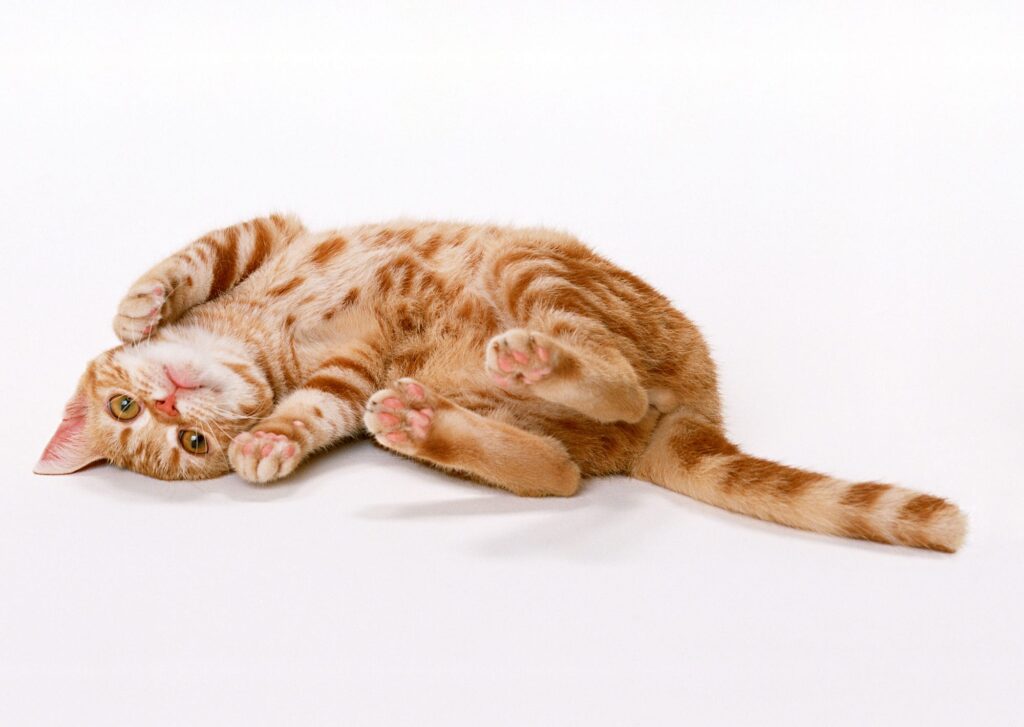Do you want to know How To Reduce Your Cats Anxiety & Stress? End your search here because you have landed the right spot and we will help you out.
Many people with cats find it difficult to help their cats relax and be happier in a stress-free environment. That’s why we made a detailed guide to help you through this challenging situation that will help you in How To Reduce Your Cats Anxiety & Stress.
This helpful guide will offer seven simple tips to make your kitty less anxious. We will make you feel safe and comfortable using relaxing exercises. We aim to help you get the information and tools necessary for a better cat life.
We see that every cat is an individual that can get anxious for a couple of reasons. That is why we have chosen different ways of healing cats in other cases. Maybe your cat gets nervous when left alone, when it’s too noisy or when their routine is disturbed. Doing so will help your cat relax and feel happy.
Let’s begin!
Understanding Cats Anxiety
Cats may demonstrate anxiety in various ways, excessive grooming, hiding, acting aggressive, trouble using the litter box, not eating, or making lots of noise. It is critical to recognize these signs early to find the causes and fix them correctly.
They get stressed if cats need a safe and secure shelter. A cat enjoys its territory and feels secure in those familiar places. Home changes like moving or introducing a new pet can make them uneasy and scared.
Another reason that cats get anxious is when they are apart from their owners. Cats enjoy people’s company and establish a very close relationship with their owners. When cats are left alone for a while, they can get nervous, shouting, scratching the furniture, or excessively grooming.
Creating A Safe And Comforting Environment for Your Cat
Ensuring your cat is safe and enjoyed is essential to making him less frightened. Choose the favourite space of your house for your cat to get some rest when they need it. This place must be serene, quiet, and warm, like home, with a litter box, food, water, and a comfortable bed.
To create a calming and comforting atmosphere, consider providing items which give pets a feeling of security, like a snuggly blanket or a cat tree where the pets can keep an eye on everything. This is the case because it enables the cats to feel more secure and well-rested.
Apart from this particular safe area, ensuring that the remaining part of your house is secure and sound for your feline is necessary. Eliminate those that can have negative consequences, such as loud sounds or sudden movements.
Make sure your cat can find places to hide if they are threatened or climb up high if they are afraid. You can cultivate an environment of peace that will help your cat feel less nervous.
Another thing that makes cats worried is their separation from their owners. Cats love interacting with people, and they are fond of their owners. If cats stay solo for an extended time, they get anxious and may meow more frequently, scratch furniture or excessively groom.
Last but not least, noisy sounds like fireworks or a storm can frighten cats. Their keen sense of hearing may make these sounds unbearable, hence the associated emotions of fear and anxiety. This makes a plan that addresses your cat’s needs more personalized and more effective.
Establishing A Routine And Providing Mental Stimulation
Cats love routine, and it can make them less nervous. Feed at designated times and stick to them as much as possible. This will thus make your cat feel more comfortable and help them know what is happening in their surroundings. Furthermore, always provide your cat with clean water and keep the litter box clean to avoid causing any additional pressure.
Besides having a predictable schedule, it’s also necessary to keep the cat’s mind occupied, which is vital for their excellent health. Interact with your cat by using toys that resemble hunting. This is a beautiful way to be physically fit and relaxes anxiety by expressing a positive emotion.
Puzzle toys or toys that give treats may be perfect for keeping your cat busy when you are not around. These toys need a little brain work to play with. They will help your cat to forget about misfortunes that make him anxious and allow him to use their instincts.
Natural Remedies for Cats Anxiety
If your cat still feels fearful after you make some adjustments at home, natural solutions may come in handy to calm down your phil-scared cat.
To calm Cats Anxiety, natural remedies like chamomile and valerian root can be taken. Such additives come in various forms, such as chews, sprays, or drops, and they should be used following a vet’s recommendations.
An appealing product formulation such as Feliway mimics the natural chemicals cats use to demonstrate that an area has been trained and is safe. Devices that emanate natural endorphins can soothe anxious feline friends (cats).
Certain oils, like lavender or chamomile, may be recommended to relax cats. You should apply a small amount of the medicine and mix it well with the water because cats can sense things better than humans.
Signs and Symptoms of Cats Anxiety
Cats can be anxious for the same reasons as otherwise people are. What are the indicators of fear in your cat? It’s essential to know him. Some common signs are:
It is an alarming sign if you find your cat preening a lot, especially in particular places. It means your pet is stressed. Grooming is what cats turn to when they feel tension.
A scaredy-cat might wisely hide in a sheltered place around the house, like under the bed or in the closet. In addition, their inclination towards keeping distance from either people or other animals is also possible.
Cancer cats are more easily irritated and are ready to growl or attack without warning. If your cat looks like an angst-ridden teenager or is scratching everything in sight, they could be upset.
Cats Anxiety can urge a cat to eat more or lose the appetite to eat at all. Please keep a close look at how your cat eats since their feeding habits will start to differ.
Cats may “meow” excessively when they are stressed. Constant meowing is a symptom of being worried. You may think your cat did nothing to arouse that feeling.
Furthermore, cats can exhibit anxiety by excessive scratching, chewing the furniture, or gnawing.
If any of these symptoms occur, it is essential to support your cat’s anxiety immediately. Neglecting it leads to behavioural issues and bad current and future health problems.
Professional Help and Medication Options
The methods of dealing with the Cats Anxiety at home are numerous, but these can sometimes be left to professional treatment.
If your cat is severely nervous or remains anxious despite your help, then it’s better to consult with its vet for the best advice. They can do such an examination and provide you with the right medicine.
At times, the vets may be administering your cat with the meds to help them with their anxiety. This is preferable to relying on training to adjust their behaviour if your cat is most likely very fearful or is not getting better with treatment.
Medications that counteract anxiety and depression are used to make your cat calmer and calmer. “However, it is vital to realize that a complete treatment plan comprising medications and an expert’s assistance should be followed while dealing with such medical conditions.
Monitoring Your Cat’s Progress and Adjusting Strategies
You should continue to check on your cat well as you start making changes to help your cat relax. If the changes do not work, you must also make adjustments. Each cat is individual, so finding something good may not be right in the other’s eye.
Keep a diary of those moments when your cat shows a better or worsening state of mind. With this, it will also be possible for you to monitor their progress and identify patterns.
Look how their body would move and how their face would twist. Are they calmer? Are they less anxious compared with those five minutes ago? Through the movements and gestures that they perform, you can see how they are feeling.
Get involved with a vet or animal expert if you doubt your cat’s status or seek more help. They can assist you by proposal, counsel, and provide you with alternative treatment options.
Keep patience and a calm attitude towards your cat to minimize Cats Anxiety. While it may take some time to identify what works and does not, patience is the key.
Conclusion: How To Reduce Your Cats Anxiety & Stress
To sum up, Being a cat owner, remember those pets must be well-fed and live in a healthy environment. Through practical application of the tricks described in this guide, you ensure that your cat is spared from the horrors of stress and leads a fuller and happier life. Create a safe space for your cat, amuse them, and consult a vet if they show unusual symptoms.
Remember to let your cat be a kitten, not worryland. Find out what exactly you should do to help the cat move on the right pathway to a tension-free life for your keepsake.
Follow Petscareins for more petscare guides!






